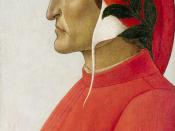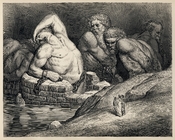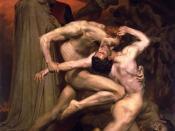Mid-way through his life and faced with an ignominious end, Dante Alighieri wrote his greatest work, The Divine Comedy. We can understand Dante's motive in writing this epic by reading Cantos I through III of Dante's Inferno. The Divine Comedy was a self-analysis by a man who found himself spiritually lost. Immediately in Canto I we see that Dante "the character" is lost on a spiritual level. He awakens mid-way through his life in a dark woods severed from both light and human connections. Dante is in the dark because he is guilty of one of the seven deadly sins, Acedia. Some dictionaries give "sloth" or "laziness" as a meaning for acedia, but it is more than physical laziness to the Christian. Acedia is moral laziness, inertia of the soul and will. This sin was evident when Dante said, "I was so full of sleep just at the point where I abandoned the true path" (ll.
11-12). Upon his awakening he is threatened by three beasts, the leopard, lion and she-wolf. The three beasts can be interpreted to represent the three major sins found in Hell fraud, violence and incontinence. Dante loses hope when, after seeing the leopard and the lion, he is confronted by the she-wolf. As the she-wolf is the living embodiment of incontinence, Dante alludes to the temptation with which he finds himself most dangerously confronted. Because Dante was being supported by a wealthy patron it was easy for him to become complacent. Having all his needs provided for, while not doing anything for either Church or State, was beginning to cause a malaise. This was, of course only one of his beasts. Dante, faced with the Herculean task of passing the three beasts, descends the hill, thereby saying that he did not have the strength...


